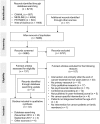Psychosocial interventions for rehabilitation and reintegration into daily life of pediatric cancer survivors and their families: A systematic review
- PMID: 29672608
- PMCID: PMC5908186
- DOI: 10.1371/journal.pone.0196151
Psychosocial interventions for rehabilitation and reintegration into daily life of pediatric cancer survivors and their families: A systematic review
Abstract
Background: The survival rate of childhood cancer patients increased over the past decades. However, even after successful treatment the transition back to normalcy is often a major challenge for the whole family. Therefore, this study aims to provide an overview of psychosocial interventions for childhood cancer survivors and their families in the first years after the end of cancer treatment.
Methods: We conducted a systematic review following the PRISMA Checklist (Preferred Reporting Items for Systematic Reviews and Meta-Analyses; PROSPERO registration number: CRD42017059782). In November 2016 and September 2017, we searched the databases CINAHL, MEDLINE, PSYNDEX, and Web of Science. We included studies investigating psychosocial interventions for childhood cancer survivors diagnosed under the age of 21, their family members or the family as a whole. Further, we summarized the study characteristics and conducted a narrative synthesis of the results. Finally, we assessed the study quality with the Effective Public Health Practice Project Quality Assessment Tool.
Results: We identified a total of 8215 records based on our database searches and 17 additional records through hand searches. We included 33 articles in the qualitative synthesis. Most of the studies described interventions for the cancer survivor (n = 15). Nine studies investigated interventions for the whole family, and two studies interventions for siblings. The interventions mainly take place in an outpatient group setting (n = 15). Overall, most of the studies reported a significant psychosocial benefit of the interventions. However, the quality of the included studies was limited.
Conclusion: In summary, we identified a broad range of different interventions and thus could give a comprehensive overview of existing interventions for childhood cancer survivors and their families. However, there is a necessity for high quality studies. The results may help to optimize health care services that support families with the re-entry into daily life.
Conflict of interest statement
Figures
Similar articles
-
Interventions for promoting habitual exercise in people living with and beyond cancer.Cochrane Database Syst Rev. 2018 Sep 19;9(9):CD010192. doi: 10.1002/14651858.CD010192.pub3. Cochrane Database Syst Rev. 2018. PMID: 30229557 Free PMC article.
-
A rapid and systematic review of the clinical effectiveness and cost-effectiveness of topotecan for ovarian cancer.Health Technol Assess. 2001;5(28):1-110. doi: 10.3310/hta5280. Health Technol Assess. 2001. PMID: 11701100
-
Factors that influence parents' and informal caregivers' views and practices regarding routine childhood vaccination: a qualitative evidence synthesis.Cochrane Database Syst Rev. 2021 Oct 27;10(10):CD013265. doi: 10.1002/14651858.CD013265.pub2. Cochrane Database Syst Rev. 2021. PMID: 34706066 Free PMC article.
-
Music interventions for improving psychological and physical outcomes in people with cancer.Cochrane Database Syst Rev. 2021 Oct 12;10(10):CD006911. doi: 10.1002/14651858.CD006911.pub4. Cochrane Database Syst Rev. 2021. PMID: 34637527 Free PMC article.
-
Signs and symptoms to determine if a patient presenting in primary care or hospital outpatient settings has COVID-19.Cochrane Database Syst Rev. 2022 May 20;5(5):CD013665. doi: 10.1002/14651858.CD013665.pub3. Cochrane Database Syst Rev. 2022. PMID: 35593186 Free PMC article.
Cited by
-
Mapping the concept, content and outcome of wilderness therapy for childhood cancer survivors: protocol for a scoping review.BMJ Open. 2019 Sep 3;9(8):e030544. doi: 10.1136/bmjopen-2019-030544. BMJ Open. 2019. PMID: 31481374 Free PMC article.
-
Loneliness predicts suicidal ideation and anxiety symptoms in long-term childhood cancer survivors.Int J Clin Health Psychol. 2021 Jan-Apr;21(1):100201. doi: 10.1016/j.ijchp.2020.10.001. Epub 2020 Nov 26. Int J Clin Health Psychol. 2021. PMID: 33363584 Free PMC article.
-
In the Shadows of Patients with Upper Gastrointestinal Cancer: An Interview Study with Next of Kin about Their Experiences Participating in Surgical Cancer Care.Clin Nurs Res. 2020 Nov;29(8):579-586. doi: 10.1177/1054773820940873. Epub 2020 Jul 10. Clin Nurs Res. 2020. PMID: 32646225 Free PMC article.
-
Needs Assessment in Parents of Children Affected by Cancer: A Qualitative Perspective.Children (Basel). 2022 Dec 13;9(12):1957. doi: 10.3390/children9121957. Children (Basel). 2022. PMID: 36553400 Free PMC article.
-
The setting up and running of a children's activity group and learning centre for children with haematological and oncology conditions.Cancer Rep (Hoboken). 2022 Jun;5(6):e1511. doi: 10.1002/cnr2.1511. Epub 2021 Aug 25. Cancer Rep (Hoboken). 2022. PMID: 34435460 Free PMC article.
References
-
- Kaatsch P. Epidemiology of childhood cancer. Cancer Treat Rev. 2010;36(4):277–85. doi: 10.1016/j.ctrv.2010.02.003 - DOI - PubMed
-
- Labay LE, Mayans S, Harris MB. Integrating the child into home and community following the completion of cancer treatment. J Pediatr Oncol Nurs. 2004;21(3):165–9. doi: 10.1177/1043454204264396 - DOI - PubMed
-
- Engelen V, Koopman HM, Detmar SB, Raat H, van de Wetering MD, Brons P, et al. Health‐related quality of life after completion of successful treatment for childhood cancer. Pediatr Blood Cancer. 2011;56(4):646–53. doi: 10.1002/pbc.22795 - DOI - PubMed
-
- Jörngården A, Mattsson E, von Essen L. Health-related quality of life, anxiety and depression among adolescents and young adults with cancer: a prospective longitudinal study. Eur J Cancer. 2007;43(13):1952–8. doi: 10.1016/j.ejca.2007.05.031 - DOI - PubMed
-
- Phipps S, Long A, Hudson M, Rai SN. Symptoms of post-traumatic stress in children with cancer and their parents: effects of informant and time from diagnosis. Pediatr Blood Cancer. 2005;45(7):952–9. doi: 10.1002/pbc.20373 - DOI - PubMed
Publication types
MeSH terms
LinkOut - more resources
Full Text Sources
Other Literature Sources
Medical
Miscellaneous


